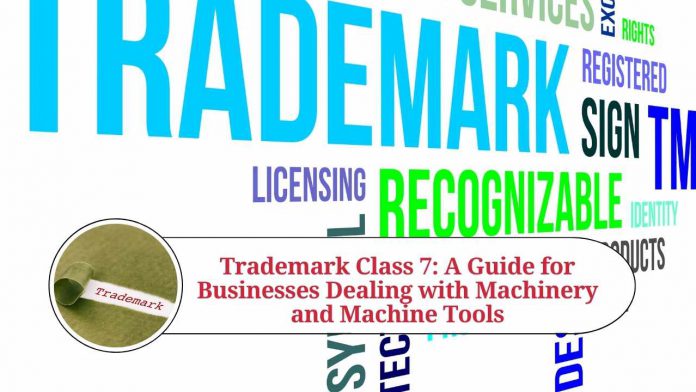Trademark Class 7: Everything You Need to Know
Trademarks are an essential aspect of protecting a company’s brand identity, products, and services. One of the most important considerations when applying for a trademark is the selection of the appropriate class or classes. Trademark classes are categories that group together similar products and services, with each class having its own set of criteria for trademark registration.
In this blog post, we will delve into Trademark Class 7, which includes machinery and machine tools, and discuss its specifics and considerations for trademark registration.
What is Trademark Class 7?
Trademark Class 7 covers machinery and machine tools. It includes a wide range of goods, including but not limited to:
- Motors and engines, except for land vehicles
- Machine coupling and transmission components, except for land vehicles
- Agricultural implements, other than hand-operated
- Machine tools
- Packaging machines
- Printing machines
- Textile machines
What are the Goods Excluded from Trademark Class 7?
While Trademark Class 7 covers a vast array of machinery and machine tools, there are some goods that are excluded from this class. These excluded goods include:
- Hand-operated tools and implements, such as hand saws and hammers
- Land vehicles and their parts and fittings
- Machine tools for working on metal, wood, and other materials
What is the Importance of Trademark Class 7?
Trademark Class 7 is essential for companies that deal with machinery and machine tools. By registering their trademarks under this class, companies can protect their brand identity and ensure that their products are not confused with those of other companies.
Trademark registration under Class 7 also gives companies the exclusive right to use their trademark for the specified goods in the class. This protection allows companies to prevent others from using their trademark for similar goods, which can prevent loss of business and revenue.
Considerations for Trademark Registration under Class 7
When applying for trademark registration under Class 7, companies should consider the following:
- The trademark must be distinctive and not descriptive of the goods or services. For example, using the word “machines” as a trademark for a machine would not be acceptable as it is too generic and descriptive.
- Companies should ensure that their trademark is not similar to any existing trademarks registered under Class 7. Conducting a comprehensive trademark search can help companies avoid infringement issues and potential legal battles.
- The goods and services associated with the trademark should be clearly defined and accurately listed in the application. This listing will help ensure that the trademark is registered for the appropriate goods and services.
Benefits of Trademark Registration under Class 7
Trademark registration under Class 7 offers a range of benefits for companies dealing with machinery and machine tools. Some of these benefits include:
- Protection of Brand Identity: Registering a trademark under Class 7 helps protect a company’s brand identity by giving them exclusive rights to use their trademark for the specified goods and services. This protection can help prevent confusion in the market and protect a company’s reputation.
- Legal Protection: Trademark registration under Class 7 gives companies legal protection against infringers. If another company attempts to use a similar trademark for similar goods, the registered trademark holder can take legal action to protect their trademark.
- Increased Business Opportunities: Registered trademarks under Class 7 can lead to increased business opportunities as potential customers can easily identify a company’s products and services. This increased recognition can lead to increased sales and revenue.
- Competitive Advantage: Trademark registration under Class 7 can give companies a competitive advantage over their competitors. By registering their trademark, companies can prevent others from using similar trademarks for similar goods, which can lead to loss of business and revenue.
Considerations for Selecting the Appropriate Trademark Class
When selecting the appropriate trademark class, companies should consider the following:
- Goods and Services: The first consideration when selecting the appropriate trademark class is the goods and services associated with the trademark. Companies should ensure that their trademark is registered for the appropriate goods and services to ensure maximum protection.
- Industry: The industry that the company operates in should also be considered when selecting the appropriate trademark class. Companies in different industries may have different trademark requirements, and selecting the appropriate class can help ensure that a company’s trademark is protected and registered appropriately.
- Geographic Location: The geographic location of the company should also be considered when selecting the appropriate trademark class. Different countries have different trademark classification systems, and companies should ensure that their trademark is registered under the appropriate class for the country or countries that they operate in.
Conclusion
Trademark registration under Class 7 is crucial for companies dealing with machinery and machine tools. By registering their trademarks under this class, companies can protect their brand identity and ensure that their products are not confused with those of other companies. When selecting the appropriate trademark class, companies should carefully consider the goods and services associated with the trademark, the industry that they operate in, and the geographic location of the company.
Read more useful content:
Frequently Asked Questions (FAQs)
What is Trademark Class 7?
Trademark Class 7 is a classification system for machinery and machine tools. It includes a wide range of goods such as motors, engines, agricultural implements, packaging machines, printing machines, and textile machines.
What are the goods excluded from Trademark Class 7?
Trademark Class 7 does not cover hand-operated tools and implements, land vehicles and their parts and fittings, and machine tools for working on metal, wood, and other materials.
Why is Trademark Class 7 important for businesses dealing with machinery and machine tools?
Trademark registration under Class 7 helps protect a company’s brand identity by giving them exclusive rights to use their trademark for the specified goods and services. It also gives legal protection against infringers and can lead to increased business opportunities.
Can I register my trademark under multiple classes, including Class 7?
Yes, it is possible to register a trademark under multiple classes if the goods and services associated with the trademark fall under different classifications.
How do I conduct a comprehensive trademark search for my trademark in Class 7?
You can conduct a trademark search using the trademark office’s online search database. It is also advisable to consult with a trademark attorney to ensure a thorough search.
What is the process for registering a trademark under Class 7?
The process for registering a trademark under Class 7 involves filing an application with the appropriate trademark office, providing evidence of use, and paying the required fees. The application will then be reviewed by the trademark office.
How long does it take to register a trademark under Class 7?
The time it takes to register a trademark under Class 7 can vary depending on the trademark office and the complexity of the application. Generally, it can take anywhere from a few months to over a year.
Can I apply for international trademark protection under Class 7?
Yes, it is possible to apply for international trademark protection under Class 7 through the Madrid System, which allows for a single application to be filed with multiple countries.
Can I renew my trademark registration under Class 7?
Yes, trademark registration under Class 7 can be renewed. It is important to keep track of the renewal dates to ensure that the trademark remains protected.
What happens if my trademark registration under Class 7 is opposed?
If your trademark registration under Class 7 is opposed, it means that someone has challenged the registration. The trademark office will review the opposition and make a decision based on the evidence presented. It is advisable to consult with a trademark attorney if your trademark registration is opposed.




















